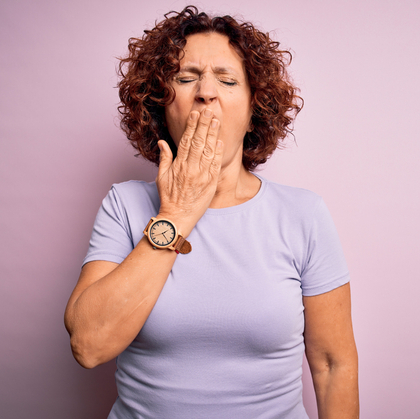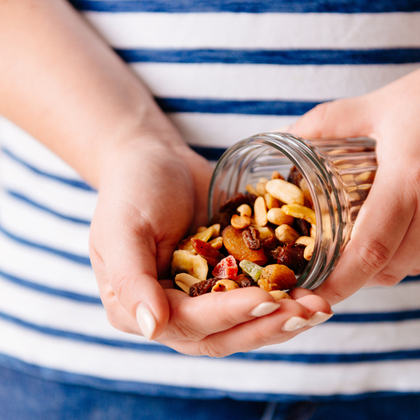
As your body adjusts to its new hormonal status, it’s not uncommon to experience fatigue and tiredness during the menopause. Understandably, dealing with exhaustion can be hugely wearing and interfere with your day-to-day activities.
Here, we explore the possible explanations of menopause tiredness, as well as outlining solutions that can help you to beat fatigue.
Why am I so tired during the menopause?
Your hormones play an important role in regulating your energy production (1). As your hormones fluctuate in the perimenopause, so too will your energy levels. In this, fatigue and lethargy become more pronounced when oestrogen drops sharply.
The additional effects of low oestrogen, including night sweats, insomnia, and frequent urination, can also lead to fragmented sleep and increased fatigue.
Night Sweats and Fatigue
Night sweats refer to hot flushes that happen at night. These episodes can interrupt your sleep and contribute to tiredness the next day, especially if they happen multiple times throughout the night.
 Declining levels of oestrogen cause problems with temperature regulation in the body and lead to overheating. This, in turn, prompts your blood vessels to dilate to release the excess heat from the body, triggering the characteristic sweating.
Declining levels of oestrogen cause problems with temperature regulation in the body and lead to overheating. This, in turn, prompts your blood vessels to dilate to release the excess heat from the body, triggering the characteristic sweating.
While night sweats may not necessarily affect the overall amount of sleep you get, they can affect your quality of sleep, and this is what can contribute to fatigue.
Night Sweats and Fatigue
Night sweats refer to hot flushes that happen at night. These episodes can interrupt your sleep and contribute to tiredness the next day, especially if they happen multiple times throughout the night.
Declining levels of oestrogen cause problems with temperature regulation in the body and lead to overheating. This, in turn, prompts your blood vessels to dilate to release the excess heat from the body, triggering the characteristic sweating.
While night sweats may not necessarily affect the overall amount of sleep you get, they can affect your quality of sleep, and this is what can contribute to fatigue.
Hot flushes and night sweats can last for 1-2 years after the menopause, with some symptoms persisting for up to 10 years (4).
As we’ve already mentioned, hot flushes not only disrupt daily activities but can also interfere with rest. Due to such sleep disturbances, many women still report daytime fatigue in the postmenopausal phase. One study even suggested that women might experience more fatigue in postmenopause than in perimenopause (5).
Perimenopause and chronic fatigue
It’s not uncommon to feel more tired than usual during the perimenopause. But recent studies have shown there could also be a link between perimenopause and a more extreme type of tiredness — chronic fatigue.
Women who go through early menopause (reaching menopause around 40-45 years of age) may be particularly susceptible to a condition called chronic fatigue syndrome (CFS) (2). CFS is characterised by long-term exhaustion that doesn't improve with rest or sleep (3). It’s incredibly important to speak to your doctor if you experience this type of tiredness.
Ways to energise yourself during the menopause
Regular exercise
Exercise is one of the best ways to tackle fatigue. Physical activity stimulates ‘feel-good’ hormones called endorphins, which improve mood and energy levels. Regular exercise also promotes quality sleep.
In a study of postmenopausal women, researchers found that performing moderate-to-high-intensity exercise was associated with increased energy (6).
Try to find an activity that excites you. Perhaps you enjoy yoga, spin or swimming? Even a bracing walk can be beneficial. Ultimately, choose something you can commit to doing regularly.
Prioritise sleep hygiene
Although hot flushes and night sweats can make getting quality sleep hard, prioritising your overall sleep hygiene will help to maintain your energy levels.
Firstly, aim to go to bed and wake up at the same time every day, even at the weekend. Try to follow same night-time rituals 30-90 minutes before bed, too. These may include unwinding in a bath, practising meditation or deep breathing, reading a book by a soft lamp, and disconnecting from technology 90-minutes before bed.
You should also avoid drinking caffeine after midday, or consuming alcohol too close to your bedtime. Ensure your bedroom is dark, quiet, and temperate, too. Experts say the ideal temperature for sleep is 18 degrees, and keeping your bedroom at this temperature can also help you manage night sweats (7).
Manage your stress
Stress is widely known to disrupt sleep. One way to mitigate stress is with relaxation. Allocate at least fifteen minutes each day to do something wholly for yourself: meditate, listen to a podcast, take a walk in the park, potter in the garden, read, lie on the sofa. Make relaxation a non-negotiable part of your daily life.
Supplements for menopause fatigue
You may also want to consider adding some key vitamins or supplements to your diet. These ones are recommended by us to help you manage different symptoms of menopause fatigue.
Vitamin D
There’s evidence to suggest vitamin D may play a role in energy production.8 The best way to obtain vitamin D is through sun exposure, but this isn’t always on hand. As such, the Department of Health recommends taking 10mcg (400iu) of vitamin D, especially in winter months.
Iron
During perimenopause, you continue to have periods — however irregularly. If your periods become heavier or longer — as they can in perimenopause — then you may lose more blood than you’re used to. Since iron helps to transport oxygen throughout the body, without enough, you feel sluggish, exhausted, and weak. Look for around 15mg in a multivitamin or single supplement.
B vitamins
With many B vitamins known to help normal energy metabolism, taking a quality B-vitamin complex is a convenient way to meet your daily nutritional needs.
Magnesium
To manage lethargy and sluggishness, consider supplementing your diet with additional magnesium, which supports the reduction of tiredness and fatigue.
PEA (Palmitoylethanolamide)
PEA is an endocannabinoid-like compound found in almost every cell, tissue, and fluid in the body. Naturally produced when cells are damaged or threatened, PEA is a well-researched alternative to CBD. It’s a popular choice to support sleep hygiene, especially when rest is interrupted by any menopause-related discomfort.
Aside from 400mg of Palmitoylethanolamide, this formula includes vitamins B12, B6 and B1, all of which contribute to the normal functioning of the nervous system and normal psychological function, making it an even better addition for sleep in menopause.
Siberian Ginseng
An ‘adaptogen’, Siberian Ginseng may help you tackle your daily workload. Since this herb has similar stimulatory properties to caffeine, we recommend taking it first thing in the morning.
More information on menopause
If you’d like to find out more about managing the menopause, including a deeper understanding of the signs and symptoms of the menopause, simply browse our dedicated menopause resources.
References:
-
(1) Unm.edu. 2020. Women, Hormones, Metabolism & Energy Expenditure. Available online: https://www.unm.edu/~lkravitz/Article%20folder/hormoneswomen.html
-
Boneva. R.S., Lin. S.J., Ungere. E.R. Early menopause and other gynecologic risk indicators for chronic fatigue syndrome in women. Menopause. 2015;1.
-
2020. Chronic Fatigue Syndrome (CFS/ME). Available online: https://www.nhs.uk/conditions/chronic-fatigue-syndrome-cfs/symptoms/
-
Dalal. P., Agrawal M., Postmenopausal syndrome. Indian J Psychiatry. 2015;57(Suppl 2):S222-S232.
-
Nagar. S., Dave P., Perception of Women Towards Physiological Problems Faced at Menopause. The Anthropologist. 2005;7(3):173-175.
-
Ward-Ritacco C. et al., Feelings Of Energy Are Associated With Physical Activity And Sleep Quality, But Not Adiposity, In Middle-aged Postmenopausal Women. Medicine & Science in Sports & Exercise. 2014;46:684.
-
Sleep.org. 2020. Best Temperature For Sleep. Available online: https://www.sleep.org/articles/temperature-for-sleep/#:~:text=In%20general%2C%20the%20suggested%20bedroom,can%20actually%20help%20facilitate%20this.
-
Staff, U., 2020. Correcting Your Vitamin D Deficiency May Help With Fatigue. Available online: https://universityhealthnews.com/daily/energy-fatigue/supplements-for-fatigue-correct-your-vitamin-d-deficiency/
Other sources:
-
The North American Menopause Society (NAMS) , Link between early menopause, chronic fatigue syndrome discovered. ScienceDaily. 2015 February 4.Available online: www.sciencedaily.com/releases/2015/02/150204075324.htm
Disclaimer: The information presented by Nature's Best is for informational purposes only. It is based on scientific studies (human, animal, or in vitro), clinical experience, or traditional usage as cited in each article. The results reported may not necessarily occur in all individuals. Self-treatment is not recommended for life-threatening conditions that require medical treatment under a doctor's care. For many of the conditions discussed, treatment with prescription or over the counter medication is also available. Consult your doctor, practitioner, and/or pharmacist for any health problem and before using any supplements or before making any changes in prescribed medications.
Related Posts

Olivia
Olivia Salter has always been an avid health nut. After graduating from the University of Bristol, she began working for a nutritional consultancy where she discovered her passion for all things wellness-related. There, she executed much of the company’s content marketing strategy and found her niche in health writing, publishing articles in Women’s Health, Mind Body Green, Thrive and Psychologies.
View More






